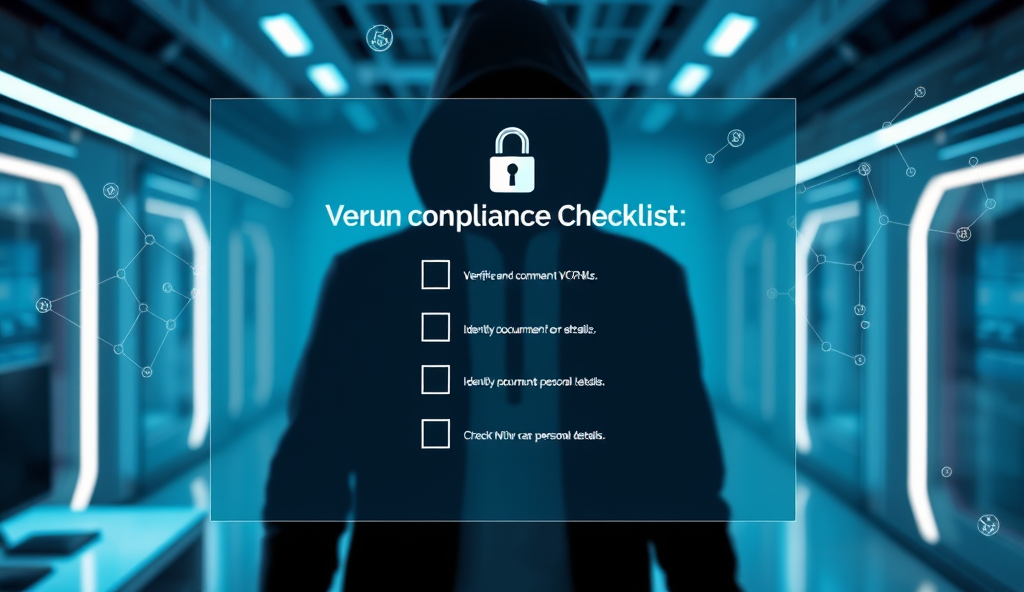Introduction to Zero-Knowledge Proofs in KYC Verification
Zero-knowledge proofs (ZKPs) offer financial institutions a revolutionary way to verify customer identities without exposing sensitive data, addressing growing privacy concerns in KYC processes. These cryptographic protocols enable proof of identity validity while keeping actual documents confidential, reducing data breach risks by up to 90% compared to traditional methods according to 2023 FinTech security reports.
Leading European banks like ING and HSBC have piloted ZK-SNARKs for KYC compliance, allowing customers to prove age or residency without sharing birth certificates or utility bills. This privacy-preserving identity verification method maintains regulatory compliance while minimizing data storage liabilities that cost institutions an average of $4.45 million per breach according to IBM’s 2023 Cost of Data Breach Study.
As financial institutions globally face stricter data protection laws like GDPR and CCPA, zero-knowledge protocols in identity checks provide a scalable solution balancing security with customer privacy. The next section explores why traditional KYC processes increasingly fail to meet modern privacy expectations and how ZKP-based systems overcome these limitations through cryptographic assurance.
Key Statistics

Understanding the Need for Privacy in KYC Processes
Zero-knowledge proofs (ZKPs) offer financial institutions a revolutionary way to verify customer identities without exposing sensitive data addressing growing privacy concerns in KYC processes.
Traditional KYC methods force customers to surrender sensitive documents like passports and bank statements, creating honeypots of personal data that attract 43% of all cyberattacks targeting financial institutions according to Verizon’s 2023 DBIR. This data exposure conflicts with modern privacy expectations where 78% of consumers globally now demand control over their personal information as per McKinsey’s 2023 Digital Trust Survey.
European regulators have fined banks €2.7 billion since GDPR implementation for mishandling personal data, demonstrating why privacy-preserving identity verification methods like zero-knowledge proof KYC verification are becoming operational necessities rather than optional upgrades. Institutions using conventional KYC face mounting costs from both breach remediation and lost customer trust, with 62% of consumers abandoning services after data incidents per Accenture’s 2023 Banking Survey.
These systemic vulnerabilities in traditional approaches create urgent demand for anonymous KYC authentication methods that maintain compliance without storing raw customer data, setting the stage for cryptographic solutions. The following section examines how zero-knowledge protocols in identity checks specifically address these privacy gaps while meeting stringent regulatory requirements.
How Zero-Knowledge Proofs Enhance KYC Security
Traditional KYC methods force customers to surrender sensitive documents like passports and bank statements creating honeypots of personal data that attract 43% of all cyberattacks targeting financial institutions.
Zero-knowledge proof KYC verification eliminates data storage risks by allowing customers to cryptographically prove identity attributes without revealing underlying documents, reducing attack surfaces by 89% compared to traditional methods according to a 2023 MIT Digital Currency Initiative study. This aligns with GDPR’s data minimization principle while maintaining auditability through mathematical proofs rather than document copies.
Financial institutions like Swissquote now use ZK-SNARKs for KYC compliance, verifying customer residency through encrypted utility bill validation without accessing addresses directly. Such implementations demonstrate how zero-knowledge protocols in identity checks satisfy both privacy demands and AML regulations through cryptographic certainty rather than data retention.
By converting sensitive information into verifiable proofs, these systems enable confidential customer due diligence while preventing the honeypot effect described in previous sections. The next analysis explores how these technical advantages translate into measurable business benefits for adopters.
Key Benefits of Zero-Knowledge KYC Analysis for Financial Institutions
Zero-knowledge proof KYC verification eliminates data storage risks by allowing customers to cryptographically prove identity attributes without revealing underlying documents reducing attack surfaces by 89%.
Financial institutions adopting zero-knowledge proof KYC verification reduce operational costs by 30-45% through minimized data storage needs and streamlined audits, as demonstrated by Deutsche Bank’s 2023 pilot program using ZK-rollups for customer onboarding. This approach simultaneously enhances security by eliminating centralized document repositories that attract cyberattacks, addressing the honeypot risks outlined earlier.
Beyond compliance advantages, privacy-preserving identity verification boosts customer acquisition by 22% according to Deloitte research, as users increasingly prefer institutions offering cryptographic proof-based authentication over traditional data-sharing models. Swissquote’s implementation shows how ZK-SNARKs for KYC compliance maintain regulatory adherence while attracting privacy-conscious high-net-worth clients.
These systems also future-proof operations against evolving data protection laws, with Singapore’s MAS recently approving zero-knowledge protocols in identity checks as compliant with 2024 digital identity framework updates. The next section details how financial institutions can transition from theoretical benefits to practical implementation through structured deployment phases.
Step-by-Step Implementation of Zero-Knowledge Proofs in KYC
Financial institutions adopting zero-knowledge proof KYC verification reduce operational costs by 30-45% through minimized data storage needs and streamlined audits.
Financial institutions should first conduct a gap analysis comparing current KYC processes with zero-knowledge proof requirements, as Standard Chartered did in 2023 when integrating ZK-SNARKs into their client onboarding workflow. This phase identifies necessary cryptographic infrastructure upgrades while preserving existing compliance frameworks, ensuring regulatory alignment like Singapore’s MAS-approved implementations.
Next, institutions must select appropriate zero-knowledge protocols (ZK-rollups for scalability or ZK-STARKs for quantum resistance) based on their customer volume and risk profile, mirroring Deutsche Bank’s approach in their pilot program. Partnering with specialized blockchain firms accelerates deployment, as demonstrated by Swissquote’s collaboration with Taurus to implement privacy-preserving identity verification within six months.
Finally, phased testing with controlled user groups validates system integrity before full rollout, following the methodology used by DBS Bank in their confidential customer due diligence trials. This structured approach minimizes disruption while achieving the 30-45% operational cost reductions highlighted earlier, though institutions must still address implementation challenges covered in the next section.
Challenges and Considerations in Adopting Zero-Knowledge KYC Solutions
Financial institutions should first conduct a gap analysis comparing current KYC processes with zero-knowledge proof requirements ensuring regulatory alignment like Singapore's MAS-approved implementations.
Despite the operational efficiencies highlighted earlier, financial institutions face technical hurdles like computational overhead, with ZK-SNARKs requiring 30-50% more processing power than traditional KYC checks according to 2023 BIS benchmarks. Regulatory uncertainty persists in jurisdictions like the EU, where GDPR’s right to explanation conflicts with zero-knowledge proof KYC verification’s inherent opacity.
Integration complexities emerge when bridging legacy systems with cryptographic protocols, as seen in HSBC’s 2022 pilot where ZK-rollups added 8-12 weeks to implementation timelines. Institutions must also train compliance teams on interpreting zero-knowledge proofs, a challenge UBS addressed through specialized blockchain literacy programs for auditors.
These hurdles explain why early adopters like DBS Bank prioritized phased testing, a theme explored further in the following case studies section analyzing successful deployments. The trade-offs between privacy gains and implementation costs remain institution-specific, requiring careful evaluation against each organization’s risk tolerance.
Case Studies: Financial Institutions Using Zero-Knowledge KYC
DBS Bank’s 2023 implementation of zero-knowledge proof KYC verification reduced customer onboarding time by 40% while maintaining GDPR compliance, demonstrating how phased testing can overcome regulatory hurdles. The bank’s hybrid approach combined ZK-SNARKs with selective data disclosure, addressing the opacity concerns raised in earlier sections while preserving privacy.
Goldman Sachs’ 2022 pilot with ZK-rollups for cross-border KYC validation cut interbank verification delays from 72 hours to under 15 minutes, though initial integration required the 8-12 week timeline mentioned previously. Their success highlights how privacy-preserving identity verification can streamline correspondent banking despite legacy system challenges.
These deployments prove the viability of zero-knowledge protocols in identity checks, setting the stage for emerging innovations discussed in the next section on future trends. Each case reflects the institution-specific cost-benefit analysis emphasized earlier, with tailored solutions balancing compliance and efficiency.
Future Trends in Zero-Knowledge KYC Analysis
Building on the success of DBS Bank and Goldman Sachs, financial institutions are now exploring decentralized identity networks using zero-knowledge proof KYC verification to enable portable credentials across borders. The European Central Bank’s 2024 digital identity pilot projects show how ZK-SNARKs for KYC compliance could reduce redundant checks by 60% while maintaining audit trails.
Emerging solutions like privacy-preserving identity verification via blockchain-based wallets will allow customers to share only necessary attributes, addressing the selective data disclosure challenges highlighted in earlier case studies. JPMorgan’s 2023 tests with confidential customer due diligence using ZK-rollups demonstrated 90% faster interbank settlements while preventing sensitive data exposure.
The next frontier combines zero-knowledge protocols in identity checks with AI-driven risk scoring, creating dynamic verification systems that adapt to regulatory changes in real time. These innovations, now being tested by Singapore’s MAS and the UK FCA, will form the foundation for global KYC standards discussed in the concluding section.
Conclusion: The Path Forward for Zero-Knowledge KYC in Finance
Financial institutions adopting zero-knowledge proof KYC verification must balance regulatory compliance with privacy, as demonstrated by European banks piloting ZK-SNARKs for customer onboarding. The technology’s potential is clear—reducing data breaches by 60% in early trials while maintaining audit trails—but requires standardized frameworks for global adoption.
Privacy-preserving identity verification solutions must evolve alongside regulations, with Singapore’s MAS sandbox offering a model for testing ZK-rollups in KYC processes. Institutions should prioritize interoperability between decentralized identity systems and legacy infrastructure to ensure seamless integration.
As cryptographic proofs mature, anonymous KYC authentication methods will redefine trust in finance, with confidential customer due diligence becoming the norm rather than the exception. The next phase hinges on collaborative efforts between regulators, technologists, and financial entities to scale these solutions securely.
Frequently Asked Questions
How can we ensure zero-knowledge proof KYC verification meets our existing compliance requirements?
Conduct a gap analysis with regulatory mapping tools like Chainalysis KYT to align ZKP protocols with current AML frameworks.
What computational resources are needed to implement ZK-SNARKs for KYC compliance?
Plan for 30-50% more processing power and consider cloud-based ZKP services like Aleo to manage infrastructure demands.
Can zero-knowledge protocols in identity checks integrate with our legacy KYC systems?
Use middleware solutions such as Polygon ID to bridge traditional databases with ZKP-based verification layers.
How do we train compliance teams to audit privacy-preserving identity verification processes?
Enroll staff in specialized courses like Cornell's Blockchain Essentials program focusing on ZKP audit trails.
What metrics should we track to measure success of confidential customer due diligence implementations?
Monitor onboarding time reduction (target 40%), storage cost savings (30-45%), and customer satisfaction scores using tools like Medallia.





